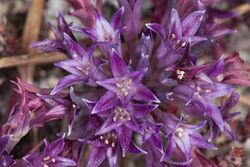Biology:Allium abramsii
| Allium abramsii | |
|---|---|

| |
| Scientific classification | |
| Kingdom: | Plantae |
| Clade: | Tracheophytes |
| Clade: | Angiosperms |
| Clade: | Monocots |
| Order: | Asparagales |
| Family: | Amaryllidaceae |
| Subfamily: | Allioideae |
| Genus: | Allium |
| Species: | A. abramsii
|
| Binomial name | |
| Allium abramsii (Ownbey & Aase ex Traub) McNeal
| |
| Synonyms | |
|
Allium fimbriatum var. abramsii Ownbey & Aase ex Traub | |
Allium abramsii is a species of wild onion known by the common name Abrams' onion.
Description
Allium abramsii grows from one or more bulbs each just over a centimeter wide attached to a thick rhizome. It reaches a maximum height of about 15 centimeters with usually one curving cylindrical leaf that may be up to a foot long.[2] The inflorescence contains up to 40 pink or purplish flowers with lance-shaped tepals and yellow anthers. [3][4][5][6]
Taxonomy
The epithet abramsii commemorates LeRoy Abrams.[7]
Distribution and habitat
Allium abramsii is endemic to the central Sierra Nevada in California , where it grows in the coniferous forest understory in granite sand soils. It is found in Fresno, Madera and Tulare Counties at elevations of 1400–2000 m.[3]
References
- ↑ "NatureServe Explorer". https://explorer.natureserve.org/Taxon/ELEMENT_GLOBAL.2.872513/Allium_abramsii.
- ↑ "Lady Bird Johnson Wildflower Center - The University of Texas at Austin". https://www.wildflower.org/plants/result.php?id_plant=ALAB2.
- ↑ 3.0 3.1 Flora of North America-Allium abramsii
- ↑ photo of herbarium specimen at Missouri Botanical Garden, isotype of Allium abramsii, collected in Fresno County
- ↑ Hickman, J. C. 1993. The Jepson Manual: Higher Plants of California 1–1400. University of California Press, Berkeley.
- ↑ McNeal, D. W. 1992. A revision of the Allium fimbriatum (Alliaceae) complex. Aliso 13(3):411–426.
- ↑ Eggli, U.; Newton, L.E. (2004). Etymological Dictionary of Succulent Plant Names. Springer Berlin Heidelberg. p. 1. ISBN 978-3-540-00489-9. https://books.google.com/books?id=u2n5vusQ1DEC&pg=PA1. Retrieved 20 September 2018.
External links
- Jepson Manual Treatment – Allium abramsii
- USDA Plants Profile-Allium abramsii
- Allium abramsii Photo gallery
Wikidata ☰ Q4732881 entry
 |



